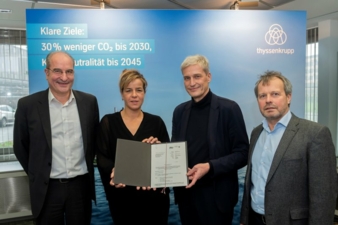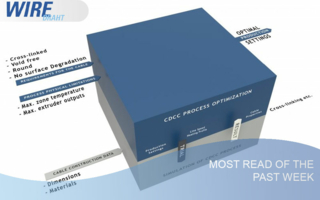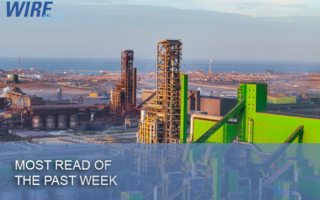09/02/2023 – Innovative melting unit for carbon-neutral steelmaking
Federal state provides 6.2 million euros
During a visit in Duisburg, Economics and Climate Protection Minister Mona Neubaur handed over a funding decision worth 6.2 million euros for a cooperation project between the steel group Thyssen Krupp Steel Europe AG and the VDEh-Betriebsforschungsinstitut (BFI) in Düsseldorf.

From left to right: Dr. Matthias Weinberg, Competence Center Metallurgy, Thyssen Krupp Steel Europe; Mona Neubaur, Minister for Economic Affairs and Climate Protection, Dr. Arnd Köfler, Chief Technical Officer; Thyssen Krupp Steel Europe, Dr. Michael Hensmann, Managing Director BFI. © Thyssen Krupp Steel Europe
North Rhine-Westphalia is continuing to push ahead with the transformation of the domestic steel industry towards carbon neutrality. During a visit to Duisburg with the Swedish ambassador, Per Thöresson, the State Minister for Economics, Industry, Climate Protection and Energy Mona Neubaur handed over a funding decision worth 6.2 million euros for a cooperation project between Thyssen Krupp Steel Europe and the VDEh Institute for Applied Research (BFI). The aim of the project, which is under the scientific leadership of BFI, is to demonstrate how sponge iron produced in direct reduction plants can be liquefied in an innovative melter unit and further processed into hot metal or steel. Direct reduction plants can be operated with green hydrogen and, in combination with a melter, offer the potential for carbon-neutral steelmaking.
State Minister Mona Neubaur said: "With more than 45,000 employees, the steel industry is a key factor in North Rhine-Westphalia's economy. At the same time, the industry is responsible for almost half of the industrial greenhouse gas emissions in our state, at 50 million metric tons of CO2 per year. We are joining forces to consolidate North Rhine-Westphalia's future as a steel location, and to achieve carbon neutrality swiftly. The cooperation project between Thyssen Krupp and the VDEh Institute for Applied Research involving the use of an innovative melting unit is another important building block in this process."
The melter, which is being funded by the state of North Rhine-Westphalia, is part of a comprehensive carbon-neutral transformation strategy at Thyssen Krupp in Duisburg at Europe's biggest steel location.
Thyssen Krupp Steel Chief Technology Officer Arnd Köfler stated: "We are breaking new ground in our transformation to carbon-neutral steelmaking: We are supplementing direct reduction with melting units and thus obtain hot metal which we can process on a one-to-one basis at our facility. Without compromising on quality, but produced in a climate-friendly way. Hydrogen-based direct reduction in combination with melters is an innovation and has not yet been implemented on a major industrial scale. It is therefore essential to apply and learn about the new technologies in practice as part of this approach. We are very pleased that the state of North Rhine-Westphalia is supporting our research project."
Following the handover of the decision, Minister Neubaur and the Swedish Ambassador Per Thöresson embarked on a discussion of the approaches and challenges for producing green steel in Sweden and North Rhine-Westphalia with metallurgy students and doctoral candidates.
Minister Neubaur: "Sweden is an important partner in future issues such as carbon-neutral steelmaking. Even though the conditions in our two countries are very different, we can learn a great deal from one another and push ahead with green steel together – including in the European network."
Ambassador Per Thöresson added: "In Sweden, we've shown that zero-emission steel production is possible, and I'm glad that in Germany we have a reliable partner who will work with us to push ahead with the decarbonization of the industry. If we act decisively now, we can counteract climate change and safeguard the competitiveness of our European industry. Both are important priorities for the Swedish Council Presidency."
Sweden holds the Presidency of the Council of the European Union in the first half of this year. Adopting green policies and the energy turnaround, have been identified as key areas for the Swedish Council Presidency to focus on.



